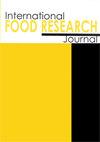黑云母果实提取物对猪肉肉丸冷藏贮藏品质的影响
IF 1
4区 农林科学
Q4 FOOD SCIENCE & TECHNOLOGY
引用次数: 0
摘要
本研究旨在评价添加牛蒡子提取物对4°C冷藏18 d猪肉肉丸的生化特性、抗氧化能力、抗菌活性和感官特性的影响。将肉丸样品分为对照、0.02%丁基羟基甲苯(BHT)、0.2%蒸馏水和乙醇提取物、0.4%蒸馏水和乙醇提取物、0.8%蒸馏水和乙醇提取物8个配方。果实水提物的抗氧化活性为34.30% ~ 75.59%,IC50为9.74 μg/mL。蒸馏水粗提物总酚含量最高,为1,550.22 mg GAE/g,类黄酮含量最高,为19.35 mg CE/g,其次为甲醇、乙醇和丙酮提取物。添加乙醇提取物和水提取物的肉丸的抗氧化活性均高于对照和BHT样品,最高浓度为0.8%。同样,在含有0.8%乙醇提取物的样品中,TBARS值最低,范围为0.08 - 0.45 mg MDA/kg样品。与添加乙醇提取物的肉丸相比,添加水提取物的肉丸的微生物计数最低,为1.94 ~ 4.90 log CFU/g。这与水提物对所有食源性致病菌的最低MIC和MBC值(3.98 mg/mL)一致。感官分析表明,在肉丸中添加乙醇提取物或水提取物,肉丸的感官属性呈浓度依赖性降低。随着添加量的增加,牛蒡子提取物对肉丸的不良感觉特性有影响。本文章由计算机程序翻译,如有差异,请以英文原文为准。
Effect of Emblica officinalis fruit extracts on the storage quality of pork meatballs under refrigerated storage
The present work aimed to evaluate the effects of the supplementation of E. officinalis fruit extracts on the biochemical properties, antioxidant capacities, antimicrobial activities, and sensory attributes of pork meatballs under refrigerated storage at 4°C for 18 days. The meatball samples were divided into eight formulations including control, 0.02% butylated hydroxytoluene (BHT), 0.2% distilled water and ethanolic extracts, 0.4% distilled water and ethanolic extracts, and 0.8% distilled water and ethanolic extracts. Aqueous fruit extract exhibited higher antioxidant activity ranging from 34.30 to 75.59%, with IC50 9.74 μg/mL as compared to the other extracts. These findings were in accordance with the highest total phenolic (1,550.22 mg GAE/g extract) and flavonoid (19.35 mg CE/g extract) contents of distilled water crude extract, followed by methanolic extract, ethanolic extract, and acetonic extract, respectively. The meatballs supplemented with both ethanolic and aqueous extracts showed higher antioxidant activity than control and BHT samples, particularly at the highest concentration of 0.8%. Similarly, the lowest TBARS values were observed in the samples with 0.8% ethanolic extracts ranging from 0.08 - 0.45 mg MDA/kg of sample. In contrast, the meatballs supplemented with aqueous extracts yielded the lowest microbial counts of 1.94 - 4.90 log CFU/g in comparison with the samples supplemented with ethanolic extracts. This was in agreement with the lowest MIC and MBC values of aqueous crude extracts (3.98 mg/mL) against all the tested foodborne pathogens. Based on sensory analysis, supplementing the pork meatballs with either ethanolic or aqueous extracts resulted in decreased sensory attributes in a concentration-dependent manner. E. officinalis fruit extracts could have an impact on unpleasant sensory characteristics in the meatballs with increasing levels of supplementation.
求助全文
通过发布文献求助,成功后即可免费获取论文全文。
去求助
来源期刊

international food research journal
Agricultural and Biological Sciences-Food Science
CiteScore
1.40
自引率
0.00%
发文量
75
期刊介绍:
The International Food Research Journal (IFRJ) publishes papers in English, six (6) issues a year with the coverage of:
Food Science and Technology
Nutrition and Dietetics
Agriculture, multidisciplinary
Chemistry, multidisciplinary
The scope of the Journal includes:
Food Science, Food Technology and Food Biotechnology
Product Development and Sensory Evaluation
Food Habits, Nutrition, and Health
Food Safety and Quality
Food Chemistry, Food Microbiology, Food Analysis and Testing
Food Engineering
Food Packaging
Food Waste Management
Food Entrepreneur
Food Regulatory
Post-Harvest Food Management
Food Supply Chain Management
Halal Food and Management
 求助内容:
求助内容: 应助结果提醒方式:
应助结果提醒方式:


